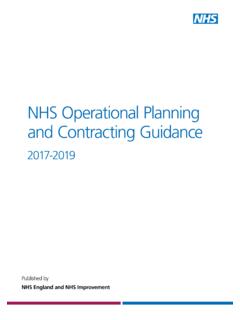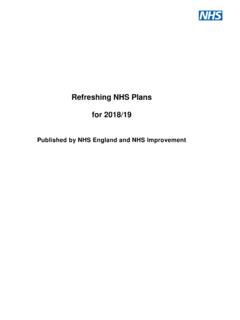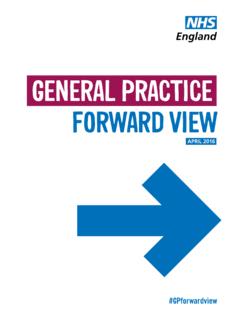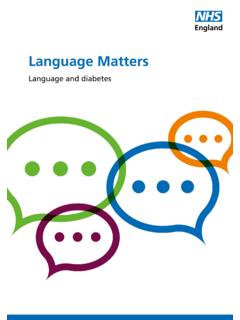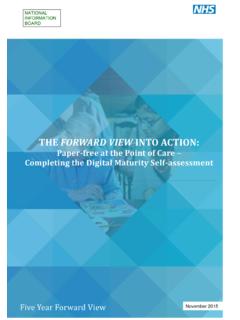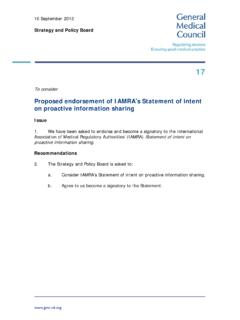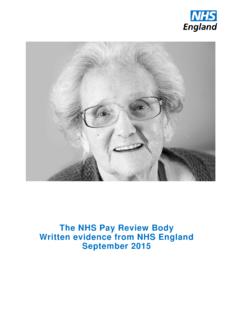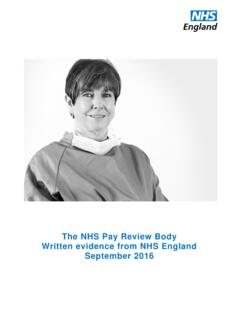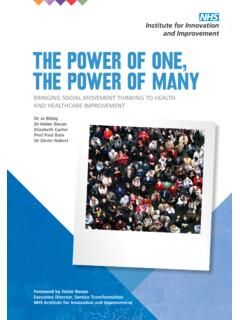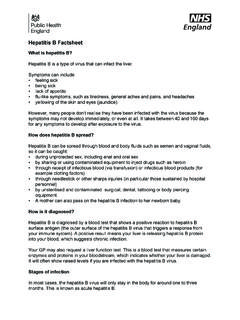Transcription of JOB DESCRIPTION - NHS England
1 JOB DESCRIPTION Job title: ADVANCED PARAMEDIC PRACTITIONER (trainee) Responsible to: Lead Partner (Clinically) Practice Manager (Administratively) Accountable to: Practice Partners Hours of work: per week. Monday, Thursday, Friday 0800-1830 (including a one-hour unpaid break daily) Job Scope The post holder s main responsibility will be to work within the Advanced Practitioner Team and with GP s. Main Responsibilities: Clinical: Provide the first point of contact for clinical queries from practice telephonists/receptionists. Be responsible for telephone triaging. Undertake urgent/same day clinics. Undertake home visits alongside the GP visiting team.
2 Assess, diagnose, plan, implement and evaluate treatment/interventions and care for patients presenting with an undifferentiated diagnosis Clinically examine and assess patient needs from a physiological and psychological perspective, and plan clinical care accordingly Assess, diagnosis, plan, implement and evaluate interventions/treatments for patients with complex needs Diagnose and manage both acute and chronic conditions, integrating both drug- and non-drug-based treatment methods into a management plan Initiate and interpret tests and investigations as appropriate. Prescribe and review medication for therapeutic effectiveness, appropriate to patient needs and in accordance with evidence-based practice and national and practice protocols, and within scope of practice Work with patients in order to support compliance with and adherence to prescribed treatments Provide information and advice on prescribed or over-the-counter medication on medication regimens, side-effects and interactions Prioritise health problems and intervene appropriately to assist the patient in complex, urgent or emergency situations.
3 Including initiation of effective emergency care Support and manage health needs of women presenting for family planning or sexual health consultation Assess, identify and refer patients presenting with mental health needs in accordance with the NSF for Mental Health Support patients to adopt health promotion strategies that promote healthy lifestyles, and apply principles of self-care Record accurate data in the patient records to an agreed standard. Collaborate with other members of the Primary Health Care Team including doctors, nurses and other AHPs, accepting referrals and referring to them for specialist care. Direct referral to and liaison with consultants and other professional agencies.
4 Ensure a high standard of clinical practice is maintained by ensuring care is based on current best practice, embarking upon further training if required and continuing to update clinical knowledge. Quality Requirements Recognise and work within own competence and professional code of conduct as regulated by the HCPC and College of Paramedics. Produce accurate, contemporaneous and complete records of patient consultation, consistent with legislation, policies and procedures Be aware of data protection (GDPR) and confidentiality issues particularly within a GP surgery. Use technology and appropriate software as an aid to management in planning, implementation and monitoring of care, presenting and communicating information Review and process data using accurate Read codes in order to ensure easy and accurate information retrieval for monitoring and audit processes.
5 Prioritise, organise and manage own workload in a manner that maintains and promotes quality Deliver care according to NSF, NICE guidelines and evidence-based care Assess effectiveness of care delivery through self and peer review, benchmarking and formal evaluation Keep up to date with current evidence-based practice. Participate in research and utilise the audit cycle as a means of evaluating the quality of the work of self and the team, implementing improvements where required In partnership with other clinical teams, collaborate on improving the quality of health care responding to local and national policies and initiatives as appropriate Support and participate in shared learning across the practice and wider organisation Assist in the development and implementation of policies and procedures Understand and apply legal issues that support the identification of vulnerable and abused children and adults.
6 And be aware of statutory child/vulnerable patients health procedures and local guidance. Participate in annual professional development review. Personal development will be encouraged and supported by the practice. It is the individuals responsibility to remain up to date with recent developments. Training requirements will be monitored by annual appraisal and will be in accordance with practice requirements. To attend and participate in Significant Event Audits To attend the UC planning meetings To work within the HCPC code of professional practice and Scope of professional conduct, H&S at work Act 1974, Data Protection Act 1984 and Access to Health Records 1990.
7 Confidentiality In the course of seeking treatment, patients entrust us with, or allow us to gather, sensitive information in relation to their health and other matters. They do so in confidence and have the right to expect that staff will respect their privacy and act appropriately In the performance of the duties outlined in this job DESCRIPTION , the post-holder may have access to confidential information relating to patients and their carers, practice staff and other healthcare workers. They may also have access to information relating to the practice as a business organisation. All such information from any source is to be regarded as strictly confidential Information relating to patients, carers, colleagues, other healthcare workers or the business of the practice may only be divulged to authorised persons in accordance with the practice policies and procedures relating to confidentiality and the protection of personal and sensitive data Health & safety The post-holder will assist in promoting and maintaining their own and others health, safety and security as defined in the practice health & safety policy, the practice health & safety manual.
8 And the practice infection control policy and published procedures. This will include: Using personal security systems within the workplace according to practice guidelines Identifying the risks involved in work activities and undertaking such activities in a way that manages those risks Making effective use of training to update knowledge and skills Using appropriate infection control procedures, maintaining work areas in a tidy and safe way and free from hazards Actively reporting of health and safety hazards and infection hazards immediately when recognised Keeping own work areas and general / patient areas generally clean, assisting in the maintenance of general standards of cleanliness consistent with the scope of the job holder s role Undertaking periodic infection control training (minimum annually) Reporting potential risks identified Equality and diversity The post-holder will support the equality, diversity and rights of patients, carers and colleagues, to include.
9 Acting in a way that recognizes the importance of people s rights, interpreting them in a way that is consistent with practice procedures and policies, and current legislation Respecting the privacy, dignity, needs and beliefs of patients, carers and colleagues Behaving in a manner which is welcoming to and of the individual, is non-judgmental and respects their circumstances, feelings priorities and rights. Personal/professional development The post-holder will participate in any training programme implemented by the practice as part of this employment, such training to include: Participation in an annual individual performance review, including taking responsibility for maintaining a record of own personal and/or professional development Taking responsibility for own development, learning and performance and demonstrating skills and activities to others who are undertaking similar work Quality The post-holder will strive to maintain quality within the practice, and will.
10 Alert other team members to issues of quality and risk Assess own performance and take accountability for own actions, either directly or under supervision Contribute to the effectiveness of the team by reflecting on own and team activities and making suggestions on ways to improve and enhance the team s performance Work effectively with individuals in other agencies to meet patients needs Effectively manage own time, workload and resources Communication The post-holder should recognize the importance of effective communication within the team and will strive to: Communicate effectively with other team members Communicate effectively with patients and carers Recognise people s needs for alternative methods of communication and respond accordingly Contribution to the implementation of services: The post-holder will: Apply practice policies, standards and guidance Discuss with other members of the team how the policies, standards and guidelines will affect own work Participate in audit where appropriate Person Specification Element Essential Desirable Qualifications Degree in Paramedic Science or equivalent.
